- Home
- Sarah Dessen
Once and for All Page 3
Once and for All Read online
Page 3
I walked to the back of the rows of chairs I’d helped set out a couple of hours earlier, taking my place on the aisle. As usual, there were a few people clumped in the back row, which was sure to annoy William, who liked his audiences uniform. “What are they even thinking? It’s not like they’re going to get called on to participate,” he’d huff. In extreme cases I’d even witnessed him pulling his rank and reseating people, although that only happened when he was feeling especially pissy.
I didn’t have such strong feelings, so I just nodded at the couple a few seats away from me as I pulled out my phone, checking the time. There were fifteen minutes to go when the first group text from my mom arrived.
SWIMMERS HEADED TO POOL.
A beat, and William appeared, magically, from behind a light-draped topiary. Smoothly, he intercepted a woman and her kid, both in bathing suits, then redirected them back past the AREA CLOSED FOR EVENT sign.
There was then a burst of organ music, so sudden I was not the only one who jumped in my seat upon hearing it. Before my mom could type the inevitable WTF??? I slid out of my chair, hustling to the back of the pool patio, where the DJ, Monty, was already holding up his hands apologetically. Under control.
Twelve minutes. I turned, looking back to the entrance to the patio, where my mom was now bent over a tow-headed ring bearer. With everything that could go wrong in a ceremony, she particularly disliked the chaos factor associated with kids and dogs, and took what she considered to be appropriate offensive action with both. For canines, this was an ample supply of cut-up hot dogs, stuffed up her sleeve in a Ziploc bag. For children, candy bribes and a stern voice usually did the trick, although balance was important when it came to the latter. There were enough emotions at stake without a crying kid kicking off the whole thing.
By seven minutes, I was back in my seat, watching William survey the crowd as the final guests found seats. Whenever he saw the lack of bodies between the fourth row and last one, he winced, although I was pretty sure only I noticed.
At six on the dot, the music was supposed to begin. Instead, my phone vibrated again. I read the text twice and still didn’t understand it.
SOB AWOL 4 AISLE WALK.
Up front, William was also getting this message. He looked at me, raising his eyebrows.
WHAT? I typed, as the man two seats down from me checked his watch.
GET HERE NOW, was the reply, and I didn’t even finish it before I was on my feet and moving.
Don’t run, don’t run, I reminded myself, trying to hustle in an efficient but not panicked-looking way across the patio. When I got to the club lobby, the wedding party was lined up, the now teary-looking ring bearer in the front. Past him, and the pairs of bridesmaids and groomsmen, was a confab of Eve Little—looking radiant in a light yellow gown with petal sleeves; I loved third weddings!—her daughter Bee, and my mother. Everyone was talking at once.
“. . . have to be confident of the precise order to do our job properly,” my mom was saying as I came up. “Last-minute additions make that difficult if not impossible.”
“I understand that,” Eve said, as Bee, her own phone to her ear, scanned the room. “But he was just here!”
“He’s stealthy that way,” Bee told me, as if I knew what this was all about. “Maybe check outside?”
I looked at my mom, who said, “You heard her. Go check outside!”
“For who?” I asked. “Everyone’s here.”
I knew this, because the Cheat Sheet was one of my assigned jobs. The night before every event, I put together a single piece of paper containing a list of the wedding party and pertinent family, contact info for the vendors we’d hired (caterer, DJ, florist) as well the final, approved wedding schedule from arrival of guests to our departure. Now, only moments in, that was out the window.
“Ambrose,” Eve said. Hearing this, my mother tried (or actually, didn’t) to mask her frustration.
“Who?”
“My brother,” Bee told me, shifting her bouquet of white roses and lilies to her other hand. She was a gorgeous girl, blonde with creamy skin and blue eyes, the kind of good-looking that would be annoying if she wasn’t so nice. “He wasn’t going to be here, but now he is. Tall, blond like me, most likely talking to a girl. Smack him if you have to.”
SOB was Son of Bride, then. And the more colloquial meaning, if he really was singlehandedly holding all this up. “On it,” I said to my mom, starting to the lobby exit. Before pushing the door open, I took one last look behind me, just in time to see William moving quickly down the aisle, his phone clamped to his ear. If he and my mom had moved to actual talking on the phone, this was even worse than I thought.
Outside, I took a quick scan of the parking lot. Two golfers were standing by an Audi with clubs poking out of the trunk, talking, while a guy in chef whites stacked vegetable crates by the kitchen entrance. Otherwise, nothing to see. Or so I thought until I heard the melodic tinkle of what could only be, in any world, a pretty girl’s laugh.
It was coming from behind a florist’s van a few spaces down from me, and was followed by another chuckle, this one distinctly male. I started toward the van, wondering again why I hadn’t just chosen to work in a coffee shop, bookstore, or some other place that didn’t involve corralling strangers against their will. I rounded the van’s back bumper, clearing my throat.
When I first saw Ambrose Little, I had two distinct thoughts, cementing how I would feel about him from that point on. I didn’t know this at the time, though. All I registered was this: First, he was incredibly good-looking. Second, just the sight of him—a mere glimpse, in profile, from a distance—annoyed me in a way I couldn’t quite explain.
First, his looks. Bee was right: they did share the same coloring and features. But Ambrose, who was in a tux and white shirt, was tall, almost gangly, with long arms and legs, distinct cheekbones, and a swoop of blond hair just tousled enough that you knew he had to spend time on it. He was like that upside-down exclamation point at the beginning of a sentence in Spanish, the mere appearance of which warned of something complicated ahead.
As far as the annoyance factor, it was harder to quantify. Maybe it was that he was so good-looking, like the chiseled, flat-chested surfer boy doll of my childhood morphed into human form. Never before, though, had I viscerally disliked someone purely on sight. It made me feel shallow in a way I didn’t like.
At that moment, however, he hadn’t even noticed me, too busy leaning into a curvy Indian girl wearing khaki shorts and a golf shirt with the country club insignia. She, in turn, was resting against a Toyota, a set of car keys dangling from one hand. They were about as close to entwined as you could be without touching, and despite my vocal warning, neither of them noticed me.
“Ambrose,” I said, in my stern voice. This time, he looked over, that curly swoop moving to the other side of his forehead. Straight on, I saw it was a perfect curl, so intact you couldn’t help but want to reach out and pull on it. Just thinking this annoyed me again. “The wedding is starting. We need you in place.”
He smiled at me then, a lazy, rich boy smile, all teeth and confidence. “Well, hey there. Who are you?”
The girl made a face, clearly unhappy with this development. I said, “I work for Natalie Barrett, the wedding planner. I need you to come with me. Now.”
He laughed, then saluted me, his hand brushing the curl. “Yes, ma’am! Just give me two shakes.” And with that, he turned back to his friend, who tilted her head up once she had his attention again.
Some people asked themselves in difficult situations What Would Jesus Do? For me, when it came to work at least, there was only one true example to follow, and I knew that in my shoes she’d take whatever measures were necessary to get things back on schedule. Next summer, a bookstore or coffee shop, I promised myself. Then I marched over, clamped a hand around Ambrose Little’s wrist, and started draggin
g him toward the club entrance.
“What the hell?” the girl said, her eyes narrowing. “You can’t just—”
But I could, and I was. I’d expected resistance, which was why I’d grabbed him with such gusto. Instead, he immediately lost his balance, stumbling forward into me while flailing for something to grab on to, which turned out to be my left breast. Now I was dragging someone while being groped, while the golfers looked on. Nice.
“Normally I like an assertive girl,” Ambrose said, regaining his footing as I shoved his hand off me. “But you’re coming on a bit strong.”
I ignored this, afraid of what I’d say if I did respond. We were almost to the club entrance; once over the threshold, he’d be my mother’s problem and I could get back to BRR duty, where I belonged.
“I feel like we haven’t been properly introduced,” he continued, as I yanked open the glass door with my free hand. “I’m Ambrose. And you are?”
“Finally,” my mother hissed, intercepting us the moment we stepped inside. I looked at a nearby clock: it was six fifteen. As she was someone who deeply prided herself on the timeliness of her events, every minute of a postponement caused an uptick in annoyance. Ambrose might not have known it, but if he’d dawdled any longer, more than his wrist would have been twisted. As it was, he gave her the same charm-confident smile, which she countered with a stare so icy I almost felt sorry for him. Almost.
“This way,” she barked, as I dropped his hand, relieved to step out of the way and the fray. He followed her without any comment, protest, or dragging involved. Even he knew right off who was the boss.
My phone buzzed. William. UPDATE?
ALL IN PLACE, I replied. HEADING TO BRR.
I walked past Ambrose and his mom, then the rest of the wedding party, which had been lined up for so long their restlessness was obvious. As I passed the bridesmaids, I felt a hand on my arm. When I turned, Bee gave me a grateful smile. “Thanks for retrieving my stupid brother.”
I nodded, markedly not assuring her he was nothing of the sort. “Of course.”
Back in the last row of chairs, there was an obvious buzz of speculation as to the delay. To the untrained ear, all waiting sounded the same, but I knew the difference and so did William, who claimed the energy of a bad start had the potential to curse any event that followed it. When I spotted him behind a pillar, I was not surprised his mouth was a thin line, the closest he’d allow to a frown while working.
Finally, at 6:23, the processional music began. I pivoted in my seat, looking over my shoulder as the ring bearer and flower girl plodded adorably down the aisle, tossing rose petals in front of them. As William ushered them into their spots, the bridal party followed, two by two, like animals to the ark. When Bee passed me, she smiled at me again, and I got the distinct feeling she was used to apologizing for her brother. In contrast, when he and Eve came along next, the crowd oohing at her yellow dress and him so handsome in his tux, he didn’t even see me.
A wedding is a series of special moments, strung together like beads on a chain. Sure, by themselves, they are lovely, but put them all together and you get art. If we did our job right, the fact that the initial moments were off wouldn’t even be remembered after the first dance, toasts, and cake cutting were done. But really, in a perfect wedding—or world—you wanted the best possible beginning. Start on a high note and, no matter what song follows, chances are just better that it will be music to your ears.
At 9:47, despite the strict ten p.m. sharp ending on the schedule, the dance floor remained crowded. Still, I took no comfort in the fact I’d been right talking to Jilly earlier. The day had been unexpectedly hot for the end of April, and the combination of stress, sunshine, and multiple hours on my feet had taken a toll. I didn’t want to go to Bendo, much less make the effort required to be “out there,” with two boys I didn’t even know. And I definitely didn’t want to dance. Which was why, when Ambrose Little emerged from the back of a rather sloppy-looking Electric Slide line, spotted me, and beckoned, I only shook my head.
This was a no-brainer, but not because of anything to do with him. The Golden Rule of working a Natalie Barrett Wedding: remember your place. It wasn’t unusual for clients, over the course of many months of planning, to develop a certain dependency on us. Huge life events that were fraught with emotion often led to displaced feelings. However, “Nobody wants to look at their pictures later and see their wedding planner acting like a guest,” my mom always reminded extra employees we took on from time to time for bigger events. “If we don’t stay out of frame, we haven’t done our job right.”
So I wasn’t surprised to be asked to dance. It happened, especially at open bar events. I was, however, not expecting him to respond to my no by shaking his own head, then walking right over and sticking his hand out to take mine.
“Dancing is healing,” he said, opening his palm wide to me as the music faded out and another song began. “Let’s heal.”
“No, thank you,” I said.
He wiggled his fingers wildly, as if imitating a sea anemone might suddenly sway my opinion.
“Thanks, but no,” I told him, switching up my three allowed words in this situation.
“Ambrose!” a girl in a short pink dress, her now bare feet crisscrossed with the evidence of previously worn sandals, hollered from the floor. “Get over here! We need you for the conga line!”
“Hear that?” he said to me. “Conga! You gotta get in on this.” When again I shook my head, he sighed loudly, then bent over with his hands on his knees, as if my response was now so tragic it had knocked the wind out of him. After a second, he lifted his head, then one hand, busting out the sea anemone move again. “Conga. Healing. Let’s go.”
“No, thanks,” I told him.
People were starting to form the line now, stumbling as they grabbed on to each other, laughing and flushed. If there was a benchmark of the Beginning of the End of a reception, this was it. Ambrose looked over, grinned, then turned back to me. “Don’t worry,” he said. “I don’t have to squeeze tight.”
“You won’t have to squeeze at all,” I said. “Because the answer is still no.”
“Aren’t you supposed to be working this event?”
“I am.”
“So you should dance, then.”
“That’s not how it works.”
“Why?”
The last thing I felt like doing was getting into the parameters of my job with a clumsy, wavering conga line approaching. “I’m not a guest, I’m an employee. We don’t dance. We work.”
He considered this briefly. “Okay, then I’m asking you to be my date. You’re off duty.”
“That’s not how it works either,” I told him.
“Man! You are tough!” He shook his head, that curl I couldn’t seem to not focus on bobbing. The conga line was now winding around a nearby chair, a red-faced man with a cigar clamped in his mouth leading it. “So what you’re saying is that you are never going to dance with me right now, no matter how I plead or beg you, even if conga is involved.”
“Correct,” I said.
“Really?” He made a face. “Shoot. I hate not having what I want.”
This was such a weird thing for him to say—arrogant, honest—that I found myself, for the first time, without a set response at hand. But as the conga line came up behind him, the girl in pink letting out a whoop as she reached for his belt buckle, I almost wished for a final beat to address this thought, one I still had myself, more often than I could admit.
I hate not having what I want.
“Don’t we all,” I said quietly, as the line blurred past me, weaving through the tables. And just like that, I reached the point where the whole thing was too much color and life and laughter, and all I could do was turn and walk away.
CHAPTER
3
ETHAN ASKED me to dance at a wedd
ing, too, and I said no. The first time.
But that was later in the story, this one I’d once told others so eagerly, and now could only repeat to myself, in my own head. You’d think in retrospect time would become linear, as if distance from events forced them to take their proper places. But something like this, I’d learned, was more fluid, as if the story was always being retold, in progress, whether you could bear to listen or not.
I was doing it again, jumping around. But it was so hard to start at the beginning when you knew how it would end.
It all happened at the Margy Love Wedding, the previous summer. My mother did not like doing out of town weddings and rarely took them on, maintaining that she was only as good as her vendors, which were all local. Margy Love’s grandpa, however, was dear friends with William’s mother. As the original benefactor of the business, Miss May—as she was known—had a certain clout even my mother couldn’t deny. Aged eighty and in assisted living, she rarely asked for favors. But when she did, the answer was always yes.
So that August, after ten months of long-distance planning with Margy (in D.C.) and her mother (in California) we packed up for a weekend in the beach town of Colby (where they’d vacationed as a family every summer of Margy’s life). The venue was only about three hours from our house door to door, and, actually, not a bleak, unpopulated place where weddings had never happened before. Not that you could tell this by how stressed my mom was or the amount of stuff she insisted we bring (three vans’ worth, one of us driving each) to ensure she’d have everything she required. My mom was wound pretty tight as a rule, at least when it came to work. But even I had rarely seen her so tense and snappy, which was why, when we finally pulled out caravan-style from the front of the house, I was happy to have the ride all to myself with just the radio for company.
Still, I missed Jilly, who had been planning to come along with me and hang out on the beach or in my room while I worked. This would have been a first for her, an entire weekend away from her family, and we’d both been looking forward to it. It wasn’t easy for the Bakers to do without her and juggle their two Cheese Therapy food trucks (they sold gourmet grilled cheese and the richest, creamiest tomato soup I’d ever tasted), which was why she usually ended up being the substitute hands-on parent to one or all of her siblings. This weekend, though, they’d promised her a pass in return for a busy summer of ferrying the twins and Crawford around, as well as changing endless diapers of Bean’s. Two days earlier, however, Cheese Therapy had been one of only twenty trucks selected for a food truck rodeo at the state capital celebrating small local businesses. It was a big deal, and they needed all hands on deck, so our getaway was out.

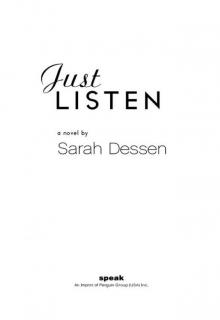 Just Listen
Just Listen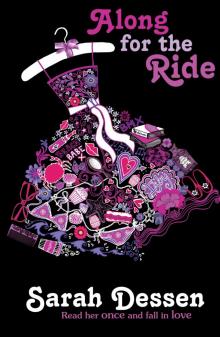 Along for the Ride
Along for the Ride This Lullaby
This Lullaby Once and for All
Once and for All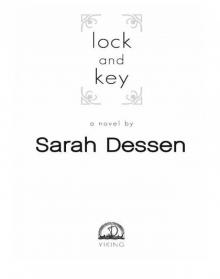 Lock and Key
Lock and Key The Truth About Forever
The Truth About Forever Someone Like You
Someone Like You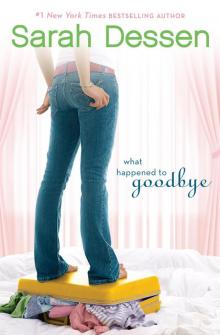 What Happened to Goodbye
What Happened to Goodbye Dreamland
Dreamland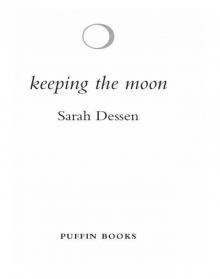 Keeping the Moon
Keeping the Moon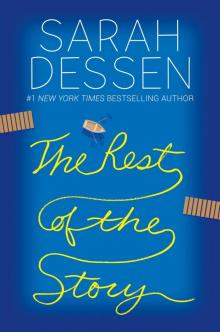 The Rest of the Story
The Rest of the Story The Moon and More
The Moon and More What Happens to Goodbye
What Happens to Goodbye